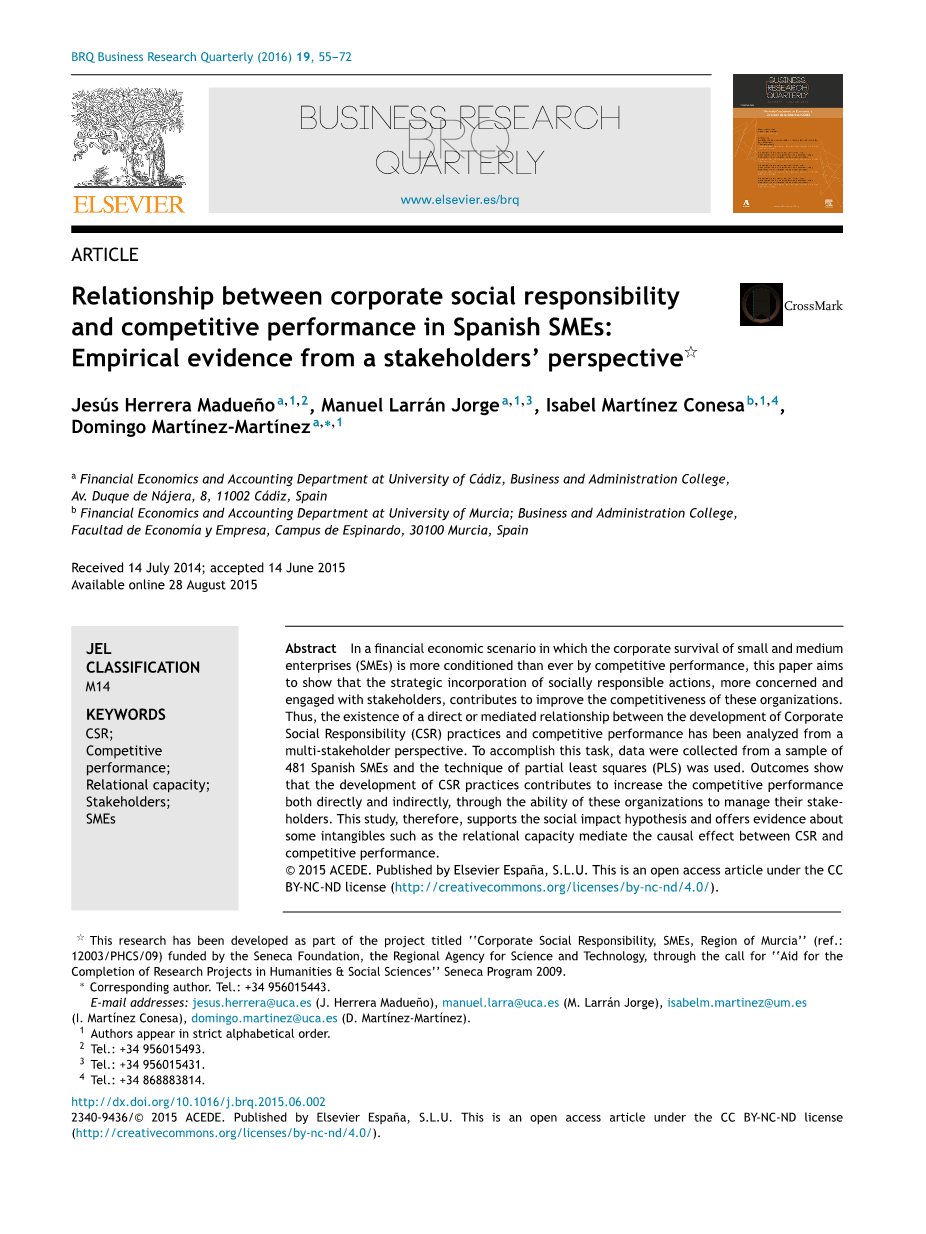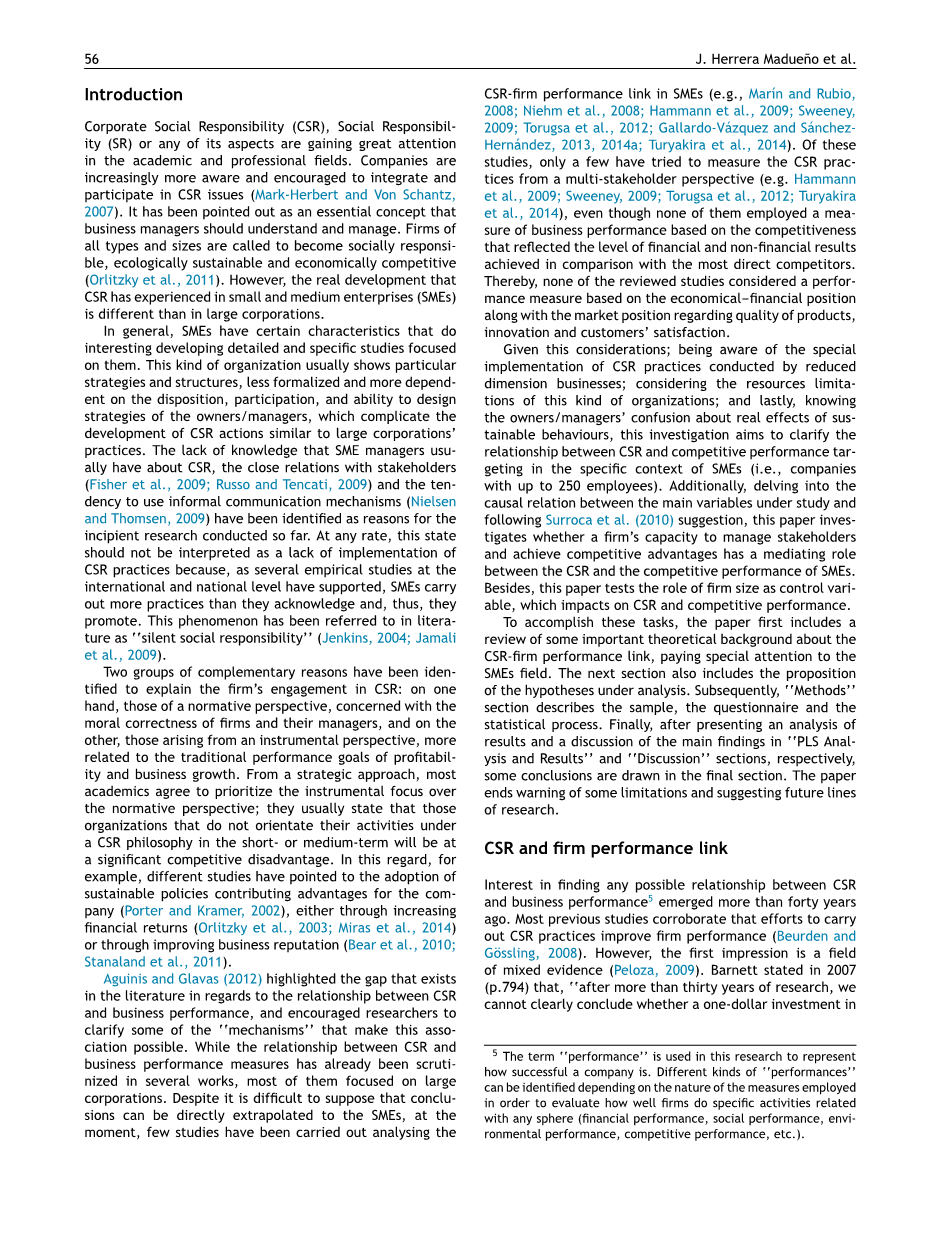

英语原文共 18 页,剩余内容已隐藏,支付完成后下载完整资料
Relationship between corporate social responsibility and competitive performance in Spanish SMEs: Empirical evidence from a stakeholdersrsquo; perspective
西班牙中小企业社会责任与竞争绩效的关系:基于利益相关者视角的实证研究
Jesuacute;s Herrera Maduenotilde; a,1,2, Manuel Larraacute;n Jorgea,1,3, Isabel Martiacute;nez Conesa b,1,4, Domingo Martiacute;nez-Martiacute;nez a,lowast;,1
Abstract
摘要
In a financial economic scenario in which the corporate survival of small and medium enterprises (SMEs) is more conditioned than ever by competitive performance, this paper aims to show that the strategic incorporation of socially responsible actions, more concerned and engaged with stakeholders, contributes to improve the competitiveness of these organizations. Thus, the existence of a direct or mediated relationship between the development of Corporate Social Responsibility (CSR) practices and competitive performance has been analyzed from a multi-stakeholder perspective. To accomplish this task, data were collected from a sample of 481 Spanish SMEs and the technique of partial least squares (PLS) was used. Outcomes show that the development of CSR practices contributes to increase the competitive performance both directly and indirectly, through the ability of these organizations to manage their stakeholders. This study, therefore, supports the social impact hypothesis and offers evidence about some intangibles such as the relational capacity mediate the causal effect between CSR and competitive performance.
在五种金融经济情景下,中小企业的生存比以往任何时候都更受竞争绩效的制约,本文旨在表明,在战略上纳入对社会负责的行动,更加关注和参与利益相关者,有助于提高这些组织的竞争力。因此,本文从多方利益相关者的角度分析了企业社会责任实践发展与竞争绩效之间存在直接或中介关系。为了完成这项任务,我们收集了481名西班牙中小企业的数据,并使用偏最小二乘(PLS)技术。研究结果表明,企业社会责任实践的发展有助于通过这些组织管理其利益相关者的能力,直接或间接地提高企业的竞争绩效。因此,本研究支持社会影响假说,并提供了一些无形的证据,如关系能力介导了企业社会责任与竞争绩效之间的因果关系。
KEYWORDS:CSR; Competitive performance; Relational capacity; Stakeholders; SMEs
关键词:企业社会责任;竞争绩效;关系能力;利益相关者;中小企业
Introduction
介绍
Corporate Social Responsibility (CSR), Social Responsibility (SR) or any of its aspects are gaining great attention in the academic and professional fields. Companies are increasingly more aware and encouraged to integrate and participate in CSR issues (Mark-Herbert and Von Schantz, 2007). It has been pointed out as an essential concept that business managers should understand and manage. Firms of all types and sizes are called to become socially responsible, ecologically sustainable and economically competitive (Orlitzky et al., 2011). However, the real development that CSR has experienced in small and medium enterprises (SMEs) is different than in large corporations.
企业社会责任(CSR)、社会责任(SR)及其任何一个方面都受到学术界和专业界的高度重视。公司越来越意识到并鼓励其整合和参与企业社会责任问题(Mark Herbert和Von Schantz,2007)。企业管理者应该理解和管理这一基本概念。所有类型和规模的公司都被要求具有社会责任感、生态可持续性和经济竞争力(Orlitzky等人,2011年)。然而,企业社会责任在中小企业的实际发展与大企业不同。
In general, SMEs have certain characteristics that do interesting developing detailed and specific studies focused on them. This kind of organization usually shows particular strategies and structures, less formalized and more dependent on the disposition, participation, and ability to design strategies of the owners/managers, which complicate the development of CSR actions similar to large corporationsrsquo; practices. The lack of knowledge that SME managers usually have about CSR, the close relations with stakeholders (Fisher et al., 2009; Russo and Tencati, 2009) and the tendency to use informal communication mechanisms (Nielsen and Thomsen, 2009) have been identified as reasons for the incipient research conducted so far. At any rate, this state should not be interpreted as a lack of implementation of CSR practices because, as several empirical studies at the international and national level have supported, SMEs carry out more practices than they acknowledge and, thus, they promote. This phenomenon has been referred to in literature as lsquo;lsquo;silent social responsibilityrsquo;rsquo; (Jenkins, 2004; Jamali et al., 2009).
总的来说,中小企业有一些特点,对它们进行了有趣的详细和具体的研究。这种组织通常表现出特定的战略和结构,形式化程度较低,更依赖于所有者/管理者的配置、参与和战略设计能力,这使得类似于大公司实践的企业社会责任行为的发展复杂化。中小企业管理者通常缺乏对企业社会责任的了解、与利益相关者的密切关系(Fisher等人,2009年;Russo和Tencati,2009年)以及使用非正式沟通机制的倾向(Nielsen和Thomsen,2009年)被认为是目前开展的初步研究的原因。无论如何,不应将这种状况解释为缺乏执行企业社会责任的做法,因为正如国际和国家一级的一些实证研究所支持的那样,中小企业执行的做法比它们所承认的要多,因此它们也在促进。这种现象在文献中被称为“沉默的社会责任”(Jenkins,2004;Jamali等人,2009)。
Two groups of complementary reasons have been identified to explain the firmrsquo;s engagement in CSR: on one hand, those of a normative perspective, concerned with the moral correctness of firms and their managers, and on the other, those arising from an instrumental perspective, more related to the traditional performance goals of profitability and business growth. From a strategic approach, most academics agree to prioritize the instrumental focus over the normative perspective; they usually state that those organizations that do not orientate their activities under a CSR philosophy in the short- or medium-term will be at a significant competitive disadvantage. In this regard, for example, different studies have pointed to the adoption of sustainable policies contributing advantages for the company (Porter and Kramer, 2002), either through increasing financial returns (Orlitzky et al., 2003; Miras et al., 2014) or through improving business reputation (Bear et al., 2010; Stanaland et al., 2011).
为了解释企业参与企业社会责任,我们确定了两组互补的原因:一方面,从规范的角度,关注公司及其管理者的道德正确性,另一方面,从工具的角度出发,更多的是与盈利和业务增长的传统绩效目标相关。从战略角度来看,大多数学者同意将工具性重点放在规范性角度之上;他们通常表示,那些短期或中期内不按照企业社会责任理念确定活动方向的组织将处于明显的竞争劣势。例如,在这方面,不同的研究指出,通过增加财务回报(Orlitzky等人,2003年;Miras等人,2014年)或通过提高商业信誉(Bear等人,2010年;Stanaland等人,2011年),采用有利于公司的可持续政策(Porter和Kramer,2002年)。
Aguinis and Glavas (2012) highlighted the gap that exists in the literature in regards to the relationship between CSR and business performance, and encouraged researchers to clarify some of the lsquo;lsquo;mechanisms
剩余内容已隐藏,支付完成后下载完整资料
资料编号:[235695],资料为PDF文档或Word文档,PDF文档可免费转换为Word


